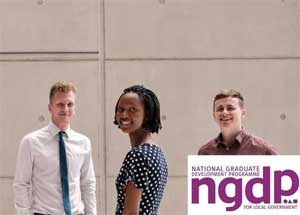Helen Reeves, Programme Manager for Leadership at the LGA, reflects on the surge of graduate talent available to local government this year through the National Graduate Development Programme, and the role it can play as a catalyst for change in your organisation.
We’ve put 2020 to bed at last, but 2021 looks just as uncertain. Some of the questions I know our partners have been wondering are:
- is my team ready for the challenges we are facing in 2021?
- how do I ensure I have the right staff for the new and complex roles emerging?
- how can I enhance collaborative working around the authority?
- where are the creative solutions we need for these challenges going to come from?
With the current lockdown 3.0, the COVID-19 vaccine roll-out, continued testing, track and trace, and economic recovery added to councils’ already extensive work streams, how do we ensure the right people are in post to lead our projects and organisations through 2021?
The answer is far from simple, but graduate recruitment is one often-overlooked piece of the puzzle. In a time where our budgets and our time are stretched, graduate recruitment might seem like a luxury. The flow of fresh talent into an organisation is, however, absolutely essential: particularly, not in spite, of times like these. Problem solving, collaborative working, and a commitment to make a difference are among the key behaviours that define graduate talent, and when you compare the level of work which graduate trainees can complete in comparison to their salary, the cost savings also become easy to measure.
The LGA’s graduate scheme for local authorities – the NGDP – has received outstanding reviews from our partner councils for almost 20 years, and everyone is welcome to take part. The scheme has received a record number of applications this year – almost 7,500 compared to 5,000 last year – as graduates across the country have seen local government rise to the challenge of the times, and only the most exceptional applicants will make it through our competitive assessment process.
The quality of our graduates is nothing new, but it is helpful to look to one of our current cohorts for an example. Kevin Kalala, based at the Royal Borough of Greenwich, springs to my mind. Kevin had only been in post for few months when COVID struck but he was immediately redeployed to Public Health, where he has supported the London response to COVID-19 testing through coordinating test clinics and planning vaccinations. He says, “So far, I have had the privilege of representing the Public Health area of the Council, Greenwich Clinical Commissioning Group and South East London Clinical Commissioning Group, as the borough testing lead. This mean that I supported the roll out of COVID-19 testing throughout each stage of the delivery cycle in partnership with Lambeth, Bexley, Lewisham, Bromley, Southwark.”
Kevin is one of the outstanding individuals who have entered local government through the NGDP. The scheme recruits and trains graduates who are deeply motivated to make a difference to local communities, and this plays a key role in their success. Kevin’s aspiration is to become a director or chief executive one day. He told us that, “my experience working for Greenwich has encouraged me to strive for the best and never place any limitations on what I can achieve.”
Motivation alone is not enough to ensure that you are recruiting top talent. Every element of the NGDP’s rigorous assessment process has been tailored to measure graduates’ skills within a local government framework. The questions in our bespoke numerical test are based on local government budgets, and our verbal tests also measure applicants’ email and report writing skills through examples of projects they would face in a local government context. The NGDP’s situational judgement questionnaire predicts applicants’ on-the-job behaviours by presenting them with examples of real situations faced by former trainees working in local government. These three tests compose the first stage of the assessment process and are followed by a video interview, assessment centre, and of course interviews with councils.
The NGDP’s assessment process is not only rigorous, it is also fair: tests have been written inclusively, trialled, and are monitored to ensure that they are upholding diversity. Following a diversity and inclusion review of our marketing, recruitment and assessment processes in 2019, we are proud to say that our latest cohort are 28 per cent BAME. Women outnumber men on the programme, and candidates who declare a disability match the performance of candidates without a declaration through the assessment process too. Our goal is to recruit a diverse collection of talented and motivated graduates who are ready to start working on your most complex projects from day one.
If you are looking at the challenges your local authority is facing in 2021, and wondering how your workforce will meet them, look again at the NGDP for a talent pipeline that can spring into action now and enrich your organisation for years to come. Local authorities can sign up until 31 March 2021. You are under no obligation to employ a graduate unless you find the right fit when conducting interviews, so I encourage you to take a look and get in touch if you want to find out more.
For more information about the NGDP and to sign up, visit the NGDP website or email Helen Reeves.

